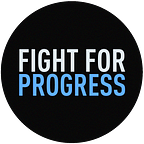Reflections on a tragic week in America
This piece was originally published in the May 29, 2020 edition of CAP Action’s daily newsletter, the Progress Report. Subscribe to the Progress Report here.
The reason we know the name George Floyd should be because he was a mentor and a friend who was beloved by his community — not because he was killed by a police officer on Monday.
Danyelle Solomon, CAP’s Vice President of Race and Ethnicity Policy, released a statement yesterday on the events of this week, quotes from which we have included throughout this issue.
A WEEK OF RECKONING IN AMERICA
“How is it that you can call the police and weaponize the words ‘African American male,’ knowing that could very well lead to someone’s death?”
This week began with a viral video of a white woman threatening to call the cops on a Black birdwatcher in New York City.
Christian Cooper was birdwatching in the Central Park Ramble, where dogs are required to be on a leash, when he encountered the woman. He asked her to leash her dog, and when she refused, he started filming. Then she threatened to call the police. But it wasn’t–and it never really is–as simple as that.
People were quick to point out the details of her threat: Not just that she would call the police — a threat with potentially lethal baggage of its own in this context — but that she would lie to the police, weaponizing her privilege by artificially raising her voice while telling them an “African American man” was threatening her life. (The woman has since apologized.)
We are lucky to have the chance to meet Christian Cooper in life rather than in memoriam, as we have come to know far too many Black men and women in America. He is an avid birder, a former editor for Marvel Comics, and a brother. “This kind of racism can kill people,” Cooper’s sister told The View this week. “It could have killed my brother.”
Which brings us to George Floyd.
TRAGEDY IN MINNEAPOLIS
“How is it that you can put your knee on a fellow human being’s neck and listen to him beg for air and just sit there?”
By now we’ve all heard the horrifying details of George Floyd’s final moments. Four officers have been fired in connection with Floyd’s death, and the University of Minnesota cut ties with the Minneapolis Police Department as a result. But, understandably, justice has yet to be served.
In the immediate wake of Floyd’s death, protesters peacefully took to the streets. In contrast to the passive reaction from law enforcement we saw during the confrontational “reopen” protests (which literally put lives at risk), Minneapolis police quickly deployed tear gas on activists chanting “I can’t breathe” and “hands up, don’t shoot” following a man’s death at the hands of a police officer who reportedly had 17 prior complaints filed against him.
WHERE DO WE GO FROM HERE?
“This can’t be our fight alone.”
George Floyd’s murder by a police officer gained national attention because it was filmed and shared with the public. But we can’t forget about the countless Black people whose murders are not the subject of viral videos, and whose families may never see justice as a result — including Tony McDade, a Black trans man who was murdered in Tallahassee this week.
As Danyelle Solomon notes in her piece, the fight for racial justice cannot be solely the responsibility of the Black community. In order to enact the massive changes needed to create a truly equitable society, it’s going to require people of all races to do their part.
For those of us who aren’t Black, and especially for white Americans, that means actively being anti-racist. It means calling out racism when you see it. It means reflecting on your privilege and the ways in which you, consciously or not, perpetrate and allow it to continue.
We’ll leave you with the words of former President Barack Obama:
“It will fall mainly on the officials of Minnesota to ensure that the circumstances surrounding George Floyd’s death are investigated thoroughly and that justice is ultimately done. But it falls on all of us, regardless of our race or station — including the majority of men and women in law enforcement who take pride in doing their tough job the right way, every day — to work together to create a “new normal” in which the legacy of bigotry and unequal treatment no longer infects our institutions or our hearts.”
FURTHER READING
- “The Intersection of Policing and Race” by Danyelle Solomon (CAP)
- The 1619 Project (NYT Magazine)
- “Policing During the Coronavirus Pandemic” by Ed Chung, Betsy Pearl, and Lea Hunter (CAP)
- “Unpacking The Invisible Knapsack” by Peggy McIntosh (Wellesley College)
- “Expanding the Authority of State Attorneys General to Combat Police Misconduct” by Connor Maxwell and Danyelle Solomon (CAP)
- “Systematic Inequality: How America’s Structural Racism Helped Create the Black-White Wealth Gap” by Angela Hanks, Danyelle Solomon, and Christian E. Weller (CAP)
- Listen to this week’s episode of The Tent podcast: George Floyd, Christian Cooper, and Being Black in America (CAP Action)
- Coretta Scott King Book Award Winning books for children and young adults
This piece was originally published in the May 29, 2020 edition of CAP Action’s daily newsletter, the Progress Report. Subscribe to the Progress Report here.
